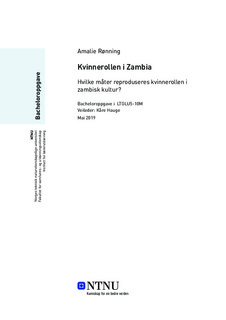Kvinnerollen i Zambia
Bachelor thesis
Permanent lenke
http://hdl.handle.net/11250/2610241Utgivelsesdato
2019Metadata
Vis full innførselSamlinger
- Institutt for lærerutdanning [3692]
Sammendrag
Denne oppgaven studerer kjønnsroller i Zambia. I den forbindelse undersøkes problemstillingen: Hvilke måter reproduseres kvinnerollen i zambisk kultur? For å belyse dette temaet vil jeg hovedsakelig bruke sosialkonstruktivismen som rammeverk for å forstå hvorfor kvinnerollen blir reprodusert, samtidig vil jeg bruke etnometodologien som et supplerende syn. Jeg vil dra inn den zambiske læreplanen og definere kjønnsroller og kultur. Jeg vil også se på om funnene kan gi informasjon om hvilke måter kvinnerollen reproduseres i den zambiske kulturen.For å redegjøre for dette har jeg samlet inn elevtekster hvor elevene forteller om en dag i sitt liv. Her kom det frem at elevene hadde mange plikter og forventinger knyttet til det at de er jenter. Jeg har også notert observasjoner av situasjoner og hendelser jeg har sett, og hatt noen uformelle samtaler med lærere. Disse gir et blikk over hvordan de voksene og samfunnet forholder seg til kvinnerollen. Jeg har med dette valgt en kvalitativ tilnærming. For å svare på problemstillingen har jeg valgt ut teorier som ser på samfunnet som sosialt konstruert, det gjør både sosialkonstruktivismen (Berger & Luckmann, 2015), etnometodologien (Tjora, 2013) og kulturbegrepet (Aagre, 2014), men på ulik måte. This study explores gender roles in Zambia. In this connection, the problem that is explored is: In which ways are women's roles reproduced in Zambian culture? To shed light on this topic, I will mainly use social constructivism as a framework to understand why the female role is reproduced, at the same time I will use etnometodology as a supplementary perspective. I will use the Zambian curriculum and define gender roles and culture. I also want to look at whether the findings can provide information on the ways in which women's roles is reproduced in Zambian culture.To account for this, I have collected pupil texts where the pupils write about a day in their life. Here it emerged that the students had many duties and expectations related to the fact that they are girls. I've also written down observations of situations and events I've seen, and I have had some informal conversations with teachers. These gave a view of how the adults and society relate to the women's role. I have chosen a qualitative approach to collect my data.To answer the problem, I have chosen theories that look at society as socially constructed. Social constructivism (Berger and Luckmann, 2015), etnometodology (Tjora, 2013) and the cultural concept (Aagre, 2014) all do his, but in different ways.
